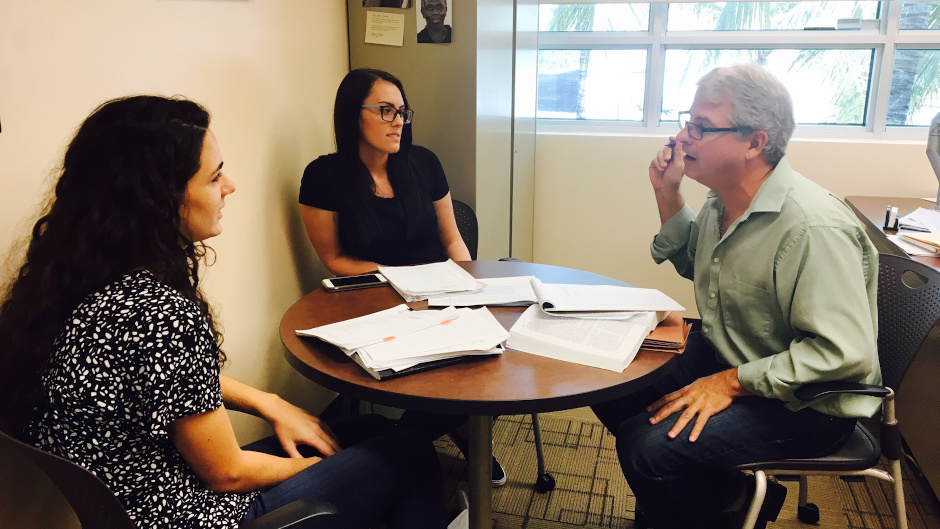After a long day of construction work that day, his boss drove him from the job site and dropped off in Jacksonville. Unbeknownst to him, an armed robbery was taking place several blocks away. After going to a convenience store, Duty was stopped by police and forced into a suggestive show-up identification. Even though he did not fit victim’s initial description and did not have the property taken from her, he was put in a police car, forced to don a white T-shirt, and driven to the victim for identification. After viewing Duty in the back of a police car, the victim identified him as the person who robbed her.
“This case represents the real would Kafkaesque nature of wrongful convictions,” says Craig Trocino, the Innocence Clinic’s Director. “A man gets dropped off from work minding his own business and then gets wrongly identified and sentenced to twenty years.”
In the Innocence Clinic, students learn the causes of wrongful convictions and how to litigate the cases in court. “I was surprised to learn in the Innocence Clinic that mistaken eyewitness identification is the leading cause of wrongful convictions,” said 2L Lauren Van Buren who was assigned to Duty’s case.
It did not take long for the Clinic to conclude that Duty’s conviction was the product of erroneous eyewitness identification and ineffective trial counsel. “After reading the trial transcripts, I was not shocked at the result,” says Van Buren. “The state’s case went virtually unchallenged, despite the defense’s access to evidence that should have been used to establish Dustin’s alibi,” she added. Duty’s boss with whom he was working at the time of the incident was waiting in the courtroom to testify during the trial, but trial counsel failed to call him as a witness and the jury never heard his testimony. To this day, Duty’s boss has been willing to help in the exoneration efforts.
Samuel J. Smargon, a volunteer staff attorney at the Innocence Clinic, and former United States Magistrate Judge, concluded “this is one of the strongest ineffective assistance of counsel cases I have ever seen. “This is a classic miscarriage of justice that the Innocence Clinic strives to resolve and exonerate the defendant,” Smargon says.
Duty has consistently maintained his innocence and in trying to vindicate himself, filed his own motions for relief in court that remained pending for over one year before he contacted the Innocence Clinic. While in prison, Duty met Jerome Hill, another Clinic client that suffered similar injustices. Hill told Duty to communicate with the Miami Law Innocence Clinic.
“It is amazing that Mr. Duty happened to meet Mr. Hill in prison, both waiting to be exonerated,” says Trocino. Duty also sent inquiries to The Innocence Project of Florida in Tallahassee and the two organizations are now jointly representing him.
“We are thrilled to be able to work as co-counsel with IPF in Tallahassee,” says Trocino. Van Buren is currently drafting a post-conviction motion on Duty’s behalf. “I am excited to have the opportunity and responsibility to work to exonerate Mr. Duty,” Van Buren says. “I am encouraged and grateful that he has the support of so many people that genuinely believe he is innocent.”

